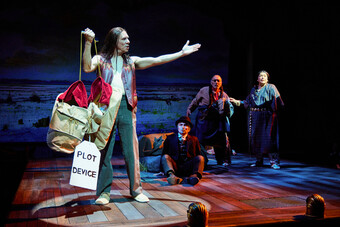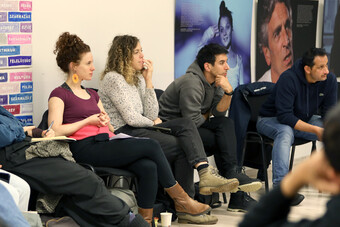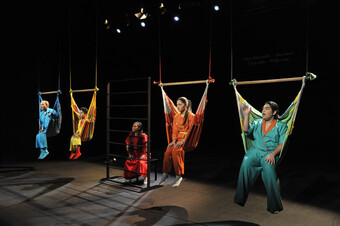New York Times Critic Watch Project
An Update
Though we've been a bit quiet here at NYTCriticWatch, we are working through our many responses to understand the patterns. If you haven't yet taken the survey, we'd love to have you. It's quick, it's important, and it's fun (we think so). Lend us your opinion!
Since we tend to ponder modern criticism here at NYTCriticWatch, we've been thinking: in the best world of American theater, should critics attend talk-backs, read playwright interviews, or otherwise engage with the writer and her body of work to better grasp the goals of her play before critiquing it? Would it not serve audiences to include in critics' coverage the playwright's intentions, where the play comes from, what the playwright thinks the play is about? This would converge with the critic's personal reaction and experience in the performance. Does this already happen with criticism of new plays? Do critics engage with writers before reviewing their new plays? Would playwrights wish to be asked these background questions by critics? Or are we crazy and a new play should be experienced without any landscape or history? We understand how little time critics are given to see and review plays. This comes from the hypothetical best world where time and word count are unlimited. What would it do to criticism? Would it be better to, in the way we understand—say—Arthur Miller's work and life, go in to a new play by a truly unknown writer having heard her point of view about her new play?











Comments
The article is just the start of the conversation—we want to know what you think about this subject, too! HowlRound is a space for knowledge-sharing, and we welcome spirited, thoughtful, and on-topic dialogue. Find our full comments policy here
As a critic, the less I know about the work the better. I like to receive it and critique it just as any audience member may experience it. I read about the artist and the piece *after* I've see the work, and may add information when pertinent. Foreknowledge can color my critique.
I'm the founder of a theatre review site (theasy.com) and this is something we deal with daily. Our approach to criticism is a bit different from the norm, as our primary purpose it to represent the experience to our readers, who we consider to be potential audience members. For a publication (print or online) that takes into account the literary component of the work, I'd expect the critic to take the playwright's intentions, source material, and background into consideration for the review. But for a review of a production, the critic is analyzing what is offered during performance. Other audience members may not take the time to read the play and learn about the artists, and more importantly they might not want to.
As a theater director, critic, and performance marketing person- I love the idea of the critic providing context within a review of new writing. Just as on an existing play or musical, critics often provide comparison to recent productions of the same work, in the case of new plays providing a bunch of info about the playwright's body of work would be helpful to the potential patron. Yes, certainly one can experience a play, like any work of art, with absolutely no context - but for the person who likes to seek out that information - the person who reads those little cards on an art galleries walls to find out where the artist was from, where they make work, what year this piece was made etc. - this kind of context is invaluable in helping to frame the work and their own experience of it.
I feel like what happens right now is that a critic if they don't know you, may make guesses and could put those guesses as facts in the review. That is a problem. Also sometimes they might learn one thing about someone and then that colors the whole review. Like when a playwright has written for a TV show and that can become ammunition. Like they've been writing for TV too long, whether or not it's true. I think the best thing is when a critic comes to see a lot of your plays and then get a good idea of what you're doing. Of course that only works if they like your plays.
Hmm...I don't know that I think the critic needs to understand the writer's goals (after all, the play needs to be judged on what it actually accomplished, not what it set out to accomplish) but I do think, in an ideal world, the critic would read the play in addition to seeing it before writing his/her review. It would protect the playwright, just a little, in those cases when the play has been compromised by a problematic production and the critic can't tell from where the problems truly arose.